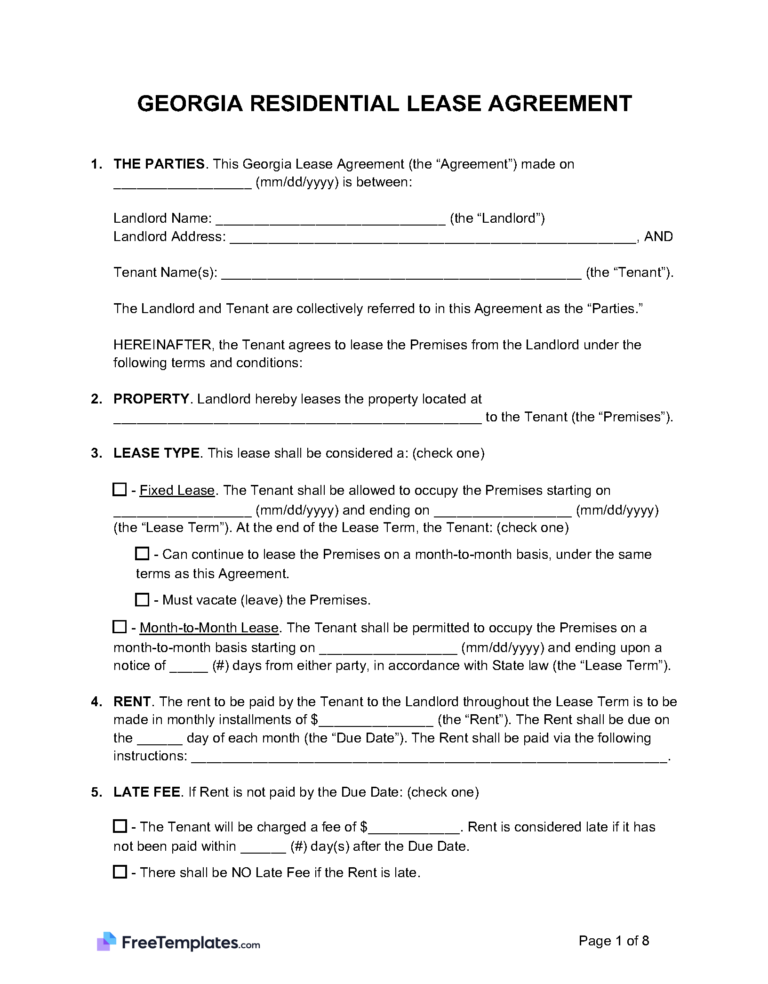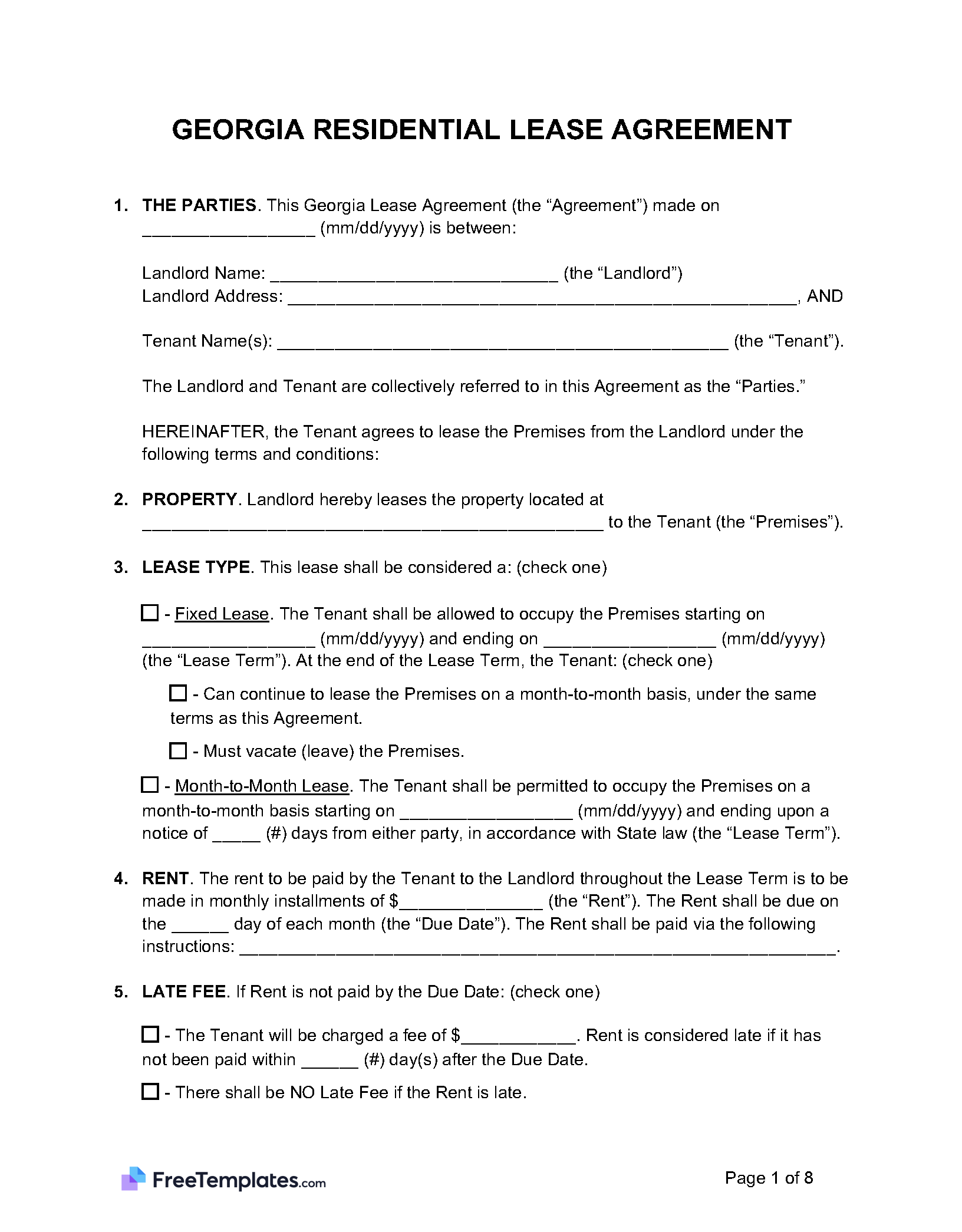By Type (6)
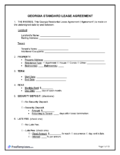 Standard Lease Agreement – A legal document for a fixed-term residential rental property. The landlord and the tenant must sign the lease. Standard Lease Agreement – A legal document for a fixed-term residential rental property. The landlord and the tenant must sign the lease. Download: PDF, MS Word, ODT |
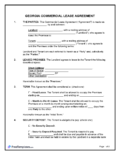 Commercial Lease Agreement – A legally binding arrangement for a business to rent a property from a landlord. Commercial Lease Agreement – A legally binding arrangement for a business to rent a property from a landlord.Download: PDF, MS Word, ODT |
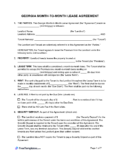 Month-to-Month Lease Agreement – A short-term rental contract in which the tenant pays the landlord monthly without a fixed term. The landlord or the tenant may terminate the contract with proper notice, typically 30 days, unless otherwise agreed upon. Month-to-Month Lease Agreement – A short-term rental contract in which the tenant pays the landlord monthly without a fixed term. The landlord or the tenant may terminate the contract with proper notice, typically 30 days, unless otherwise agreed upon.Download: PDF, MS Word, ODT |
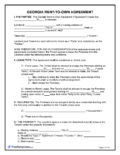 Rent-to-Own Agreement – A contractual arrangement in which the tenant has the option to purchase the property from the landlord at a disclosed date after a certain period of renting. Typically, a portion of the payment will go toward the purchase price of the rental unit. Rent-to-Own Agreement – A contractual arrangement in which the tenant has the option to purchase the property from the landlord at a disclosed date after a certain period of renting. Typically, a portion of the payment will go toward the purchase price of the rental unit.Download: PDF, MS Word, ODT |
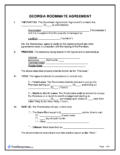 Roommate Agreement – A legal document between co-tenants sharing a living space. Roommate Agreement – A legal document between co-tenants sharing a living space.Download: PDF, MS Word, ODT |
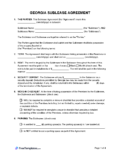 Sublease Agreement – A contractual document in which the current tenant rents out all or part of the rental property to a new tenant (sublessee) for a certain period of time. The original tenant (sublessor) is ultimately responsible. Sublease Agreement – A contractual document in which the current tenant rents out all or part of the rental property to a new tenant (sublessee) for a certain period of time. The original tenant (sublessor) is ultimately responsible.Download: PDF, MS Word, ODT |
Disclosures (5)
Contact Details – The tenant must receive the property owner’s or authorized agent’s name and address for receiving legal notices. Should there be any changes during the duration of the lease, the tenant must be notified within 30 days by mail or posting in a common area. (§ 44-7-3(a))
Condition of Property – If the landlord owns more than 10 rental units (§ 44-7-36), they must give the tenant a detailed list of any existing damage to the property, which the tenant can keep. The tenant has the right to inspect the property and verify the list before moving in. Both parties must sign the list to prove its accuracy, except for hidden issues. Should the tenant object to any of the items on the list, they must state their disagreements and sign it. (§ 44-7-33(a))
Flooding – Before entering a lease agreement for a residential property, the landlord must inform the tenant if any flooding has damaged any of the living space or its attachments at least 3 times in the last 5 years. (§ 44-7-20)
Lead-Based Paint Disclosure – Landlords must disclose if there is any lead-based paint in properties built before 1978.
Security Deposit Location – Landlords who own more than 10 rental units must provide written notice with details on where the deposit or rent advance is being held. This must be done either in the lease agreement or within 30 days of receiving the funds. If this should change, the landlord has 30 days to notify the tenant. (§ 83.49(2))
Security Deposit
Maximum Amount – Georgia law does not disclose or regulate the maximum amount a landlord can charge their tenant.
Holding Account – If the landlord owns more than 10 rental units, and a tenant gives a security deposit or a rent advancement, the landlord must do one of the following (§ 44-7-36):
- Keep the money in a separate non-interest-bearing account in a Florida bank without using it until it’s due. (§ 83.49(1a))
- Keep the money in a separate interest-bearing account in a Florida bank, with the tenant receiving at least 75% of the annualized average interest rate or 5% per year. The funds must remain untouched until the end of the lease duration. (§ 83.49(1b))
- Post a surety bond with the country’s circuit count where the rental property is located for the total amount of $50,000, whichever is less. The landlord must pay the tenant 5% interest per year. If the landlord rents in 5 or more counties, they can post a bond with the Florida Secretary of State for the total deposit amount, or $250,000, whichever is less. (§ 83.49(1c))
Returning to Tenant – Within 3 business days or less of the lease ending, landlords who own more than 10 rental units or their agents must inspect the property, create a list of any damage outside of normal wear and tear, and estimate the cost of repairs. If the tenant leaves without notice, the inspection must be done in a reasonable amount of time. (§ 44-7-36) (§ 83.49(3)) (§ 44-7-33(B1))
Landlord Access
General Access – Tenants have the legal right to deny entrance to the property except for emergencies if disclosed in the lease agreement. Otherwise, landlords must give reasonable notice prior to entrance. (Georgia Landlord Tenant Handbook, page 13)
Emergency Access – In the case of emergencies, landlords or their agents can enter the rental property.
Paying Rent
Grace Period – Georgia has no statutory grace period for late rent payments.
Maximum Late Fee – Landlords are not restricted to a maximum late fee when a tenant does not pay rent on time. However, it must be reasonable.
Returned Checks (NSF) – Landlords can charge a fee for a bounced check. However, it cannot exceed $30 or 5% of the amount of the check, whichever is greater. (§ 13-6-15)
Reasons for Eviction (3)
Non-Payment of Rent – If the tenant fails to pay rent on time, the landlord can start eviction. (§ 44-7-50(A))
Non-Compliance – The landlord can seek an eviction if the tenant violates any lease agreement terms, such as causing damage to the property or engaging in illegal activities. (§ 44-7-50)
Failure to Give Notice – If the tenant fails to give 30 days’ notice before moving out, the landlord can seek an eviction. (§ 44-7-7)
